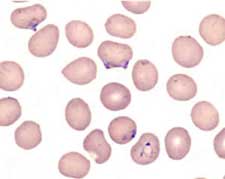Diagnosing and Treating Malaria
The early symptoms of malaria mimic other, potentially less serious illnesses, such as the flu. In regions where malaria commonly occurs, health-care providers easily recognize the illness, and treatment begins quickly. Outside of these areas health-care providers rarely think of malaria, and that can be a problem for someone who has been exposed to the illness. Proper diagnosis becomes particularly important if the disease is caused by the P. falciparum parasite.

Photo courtesy of CDC. Children are among the most vulnerable to malaria.
|
 Photo courtesy of CDC. This slide shows the P. falciparum parasite in a blood smear. Notice that some of the blood cells appear to have ruptured. |
Young children must receive prompt treatment for malaria, because they have no immunity to the disease. This makes them the most likely to progress to severe malaria. In fact, in areas where malaria is endemic, the World Health Organization recommends that all children under age five with a fever of unknown origin be treated for malaria, even before confirmation of the diagnosis.
Where malaria rarely occurs, health-care providers do not necessarily recognize the illness right away. A person who develops a flu-like illness after traveling to a country where malaria occurs must make sure that health-care providers are aware of exposure to malaria. A person may contract malaria even with preventive treatment.
A blood test confirms the diagnosis. For a long time, the smear was the only blood test available. When viewed under a microscope, a sample of blood from a person with malaria showed thePlasmodium parasites. In recent years rapid, do-it-yourself immunological tests have been developed. These tests can identify the infecting parasite. Identifying the parasite causing the malaria affects the treatment. Why? The parasites each respond better to different antimalarial drugs. Commonly, a person can be infected by more than one type of Plasmodium. When this occurs, combinations of different antimalarial drugs are used. In addition, all patients with P. falciparum must receive antimalarial drugs to prevent severe malaria.
Patients with uncomplicated malaria can be treated at home. However, patients with severe malaria must be hospitalized. They need antimalarial drugs as well as treatment for the other conditions caused by severe malaria.
Each antimalarial drug works a little differently from the others. In addition, some parasites have built up immunity to certain drugs. Matching the right drug to the right parasite becomes very important.
This content has been re-published with permission from SEED. Copyright © 2025 Schlumberger Excellence in Education Development (SEED), Inc.

